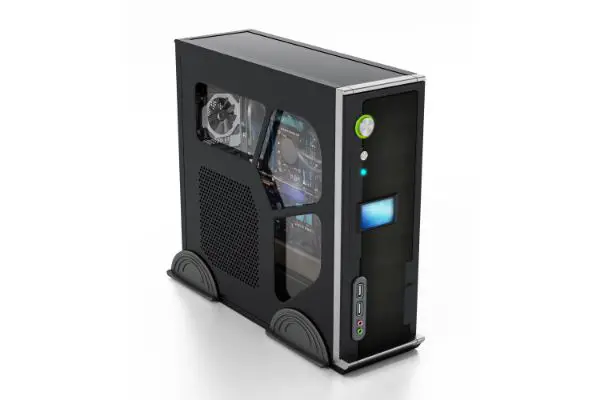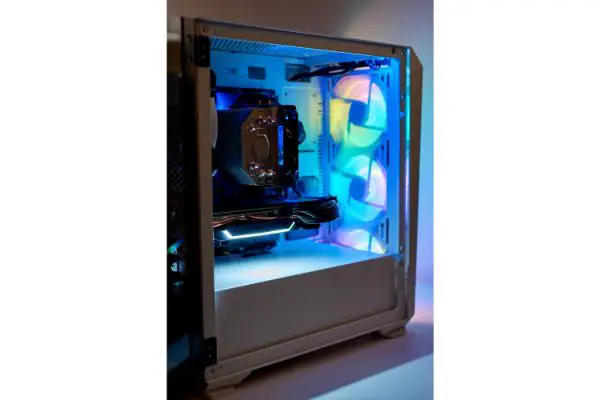Disclaimer: This post may contain affiliate links, meaning we get a small commission if you make a purchase through our links, at no cost to you. For more information, please visit our Disclaimer Page.
Your PC case is one of the most important components in your computer. Not only does it protect your internal components, but it also helps to cool them down. If your PC case gets too hot, it can cause serious damage to your system.
In this blog post, we will discuss the reasons your PC case might be getting too hot and how you can fix the problem. We will also provide some tips on how you can keep your PC case cool in the future!
Table of Contents
Why Does My PC Case Get So Hot? 10 Reasons
So you’ve been noticing that your PC case has been getting hot. Luckily, you’re not alone. There are several reasons your PC case might be getting too hot.
Here is a list of the most common reasons:
1. Poor Airflow:
If your PC case does not have good airflow, the hot air will get trapped inside and cause the temperature to rise. Make sure that you have adequate ventilation in your case and that the airflow is not being blocked by dust or other debris.
2. Overclocking:
Overclocking your CPU can cause your PC case to get very hot. When you overclock your system, you are pushing it to its limits. This can cause your components to run hotter than they normally would.
If you are overclocking your system, make sure that you have a good cooling solution in place. Otherwise, you run the risk of damaging your components.
3. Lack of Fans:
If your PC case does not have enough fans, the hot air will not be able to escape and the temperature will rise. Make sure that you have at least two fans in your case, one for intake and one for exhaust.
You can also try to improve the airflow in your case by adding more fans or by installing a fan controller.
4. Poorly Designed Case:
Some PC cases are not designed well and do not have good airflow. If you have a poorly designed case, it might be time to upgrade to a better one. To find a good case, look for one that has plenty of ventilation and that is easy to clean.
5. Components:
Some components, such as the CPU and GPU, generate a lot of heat. If your components are running hot, it can cause your PC case to get very hot. Make sure that you have good cooling solutions for your components.
6. Ambient Temperature:
The temperature of your environment can also affect the temperature of your PC case. If it is very hot outside, the heat will transfer to your PC case and make it hotter. If you live in a warm climate, consider getting a case with good ventilation or even an air conditioner for your room.
7. Dirty Components:
Dust and other debris can build up on your components and block the airflow. This can cause your components to run hotter than they should. Make sure that you clean your components regularly to prevent this from happening.
8. Faulty Components:
Sometimes, components can fail and cause your PC case to get very hot. If you suspect that a component is causing the problem, try replacing it with a new one.
9. Power Supply:
If your power supply is not working properly, it can cause your PC case to get very hot. A power supply unit may fail if it is overloaded or if it is not properly ventilated. If you think that your power supply is the problem, try replacing it with a new one.
To check if your power supply is the problem, you can use a multimeter to test it.
10. Other Causes:
There are a few other causes that can cause your PC case to get very hot. These include improper cable management, blocked vents, and restricted airflow. Make sure that you check all of these things before you conclude that your PC case is getting too hot.
Is It Normal for a PC Case To Get Hot?
It’s normal for your PC case to get a little warm to the touch since most cases are made out of steel or aluminum, both of which are great conductors of heat. So, If it gets too hot to keep your hand on, though, that’s a sign that something isn’t quite right.
To figure out if your case is getting too hot, you’ll need to measure its internal temperature. The best way to do this is with a thermal sensor placed inside the case.
You can find these sensors online or at your local electronics store. Once you have a sensor, all you need to do is place it inside the case and connect it to your PC.
Most sensors will come with software that will allow you to see the temperature of your case in real-time. If you don’t want to buy a sensor, you can also use a regular thermometer. Just place it inside the case and check the temperature after a few hours.
Ideally, the temperature of a PC running essential services should be around 150 degrees Fahrenheit. If it’s anything higher than that, then you have a problem.
How Hot Should My PC Case Be?
Your computer case should not be getting too hot. If you notice that your computer is shutting down or restarting on its own, it could be because the case is overheating.
The ideal temperature for a PC case is between 140 and 150 degrees Fahrenheit (60 to 70 degrees Celsius). Anything above 175 degrees F or 80 degrees C is cause for concern.
How do I cool down my computer case? 9 Fixes
There are a few things that you can do to fix an overheating computer case.
1. Check if the case fans are working properly. If not, clean them or replace them
One reason why your PC case might be getting too hot is because the case fans are not working properly. Make sure to check if they are clean and free of dust before proceeding to other solutions. You can also try replacing them with new ones.
2. Make sure that the air vents are not blocked
The air vents of your computer case need to be unobstructed so that hot air can escape. Check if there are any objects blocking the vents and remove them if necessary.
You can also try opening up the case and letting it cool down for a while. Just make sure that you don’t touch any of the components inside.
3. Try using a fan to blow air into the case
You can try using a small fan to blow air into the case. This will help circulate the air and hopefully lower the temperature inside the case.
Just be careful not to use a powerful fan as it might damage the components inside.
4. Check the BIOS settings
The BIOS settings might be incorrect, which can cause the computer case to overheat. Try resetting the BIOS to default settings and see if that helps.
5. Update the drivers
Outdated drivers can also cause overheating issues. Make sure that you update all the drivers on your computer.
6. Use thermal paste
Check if a particular component is getting too hot. If it is, then you can try using a thermal paste to help dissipate the heat better.
If you have applied the thermal paste to the CPU, make sure that it is not too thick. A thin layer of thermal paste is all you need.
You can also try using a different thermal paste if the one you are using is not working well.
7. Overclock at your own risk
Overclocking can make your computer faster but it can also cause the components to overheat. If you do overclock, make sure that you keep an eye on the temperatures.
If the temperatures start to get too high, then back off on the overclock.
Overclocking is not for everyone and it is definitely not recommended for beginners.
8. Get a better case
If you have tried all of the above and your computer case is still overheating, then you might need to get a better case.
A better case will have better airflow and might even come with additional fans.
Just make sure that you get a case that is compatible with the rest of your components.
9. Install additional Fans
Additional fans will help improve airflow and keep your computer case cooler.
Make sure that the fans are compatible with your motherboard and case.
Use a fan controller to regulate the speed of the fans.
Installing additional fans is a pretty easy way to keep your computer case from overheating.
These are just a few ways to fix an overheating computer case. If you have any other tips, feel free to share them in the comments below!
The Bottom Line
An overheating computer case can be a serious problem. If not fixed, it can lead to damage to the components inside.
Make sure to keep an eye on the temperature of your computer case and take action if it starts to get too hot.
By following the tips above, you should be able to keep your computer case cool and avoid any damage.


